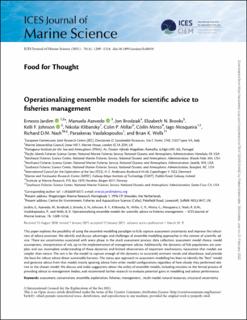| dc.contributor.author | Jardim, Ernesto | |
| dc.contributor.author | Azevedo, Manuela | |
| dc.contributor.author | Brodziak, Jon | |
| dc.contributor.author | Brooks, Elizabeth N | |
| dc.contributor.author | Johnson, Kelli F | |
| dc.contributor.author | Klibansky, Nikolai | |
| dc.contributor.author | Millar, Colin | |
| dc.contributor.author | Minto, Cóilín | |
| dc.contributor.author | Mosqueira, Iago | |
| dc.contributor.author | Nash, Richard David Marriott | |
| dc.contributor.author | Vasilakopoulos, Paraskevas | |
| dc.contributor.author | Wells, Brian K | |
| dc.date.accessioned | 2022-03-07T10:32:11Z | |
| dc.date.available | 2022-03-07T10:32:11Z | |
| dc.date.created | 2022-02-20T13:08:44Z | |
| dc.date.issued | 2021 | |
| dc.identifier.citation | ICES Journal of Marine Science. 2021, 78 (4), 1209-1216. | en_US |
| dc.identifier.issn | 1054-3139 | |
| dc.identifier.uri | https://hdl.handle.net/11250/2983367 | |
| dc.description.abstract | This paper explores the possibility of using the ensemble modelling paradigm to fully capture assessment uncertainty and improve the robustness of advice provision. We identify and discuss advantages and challenges of ensemble modelling approaches in the context of scientific advice. There are uncertainties associated with every phase in the stock assessment process: data collection, assessment model choice, model assumptions, interpretation of risk, up to the implementation of management advice. Additionally, the dynamics of fish populations are complex, and our incomplete understanding of those dynamics and limited observations of important mechanisms, necessitate that models are simpler than nature. The aim is for the model to capture enough of the dynamics to accurately estimate trends and abundance, and provide the basis for robust advice about sustainable harvests. The status quo approach to assessment modelling has been to identify the “best” model and generate advice from that model, mostly ignoring advice from other model configurations regardless of how closely they performed relative to the chosen model. We discuss and make suggestions about the utility of ensemble models, including revisions to the formal process of providing advice to management bodies, and recommend further research to evaluate potential gains in modelling and advice performance. | en_US |
| dc.language.iso | eng | en_US |
| dc.title | Operationalizing ensemble models for scientific advice to fisheries management | en_US |
| dc.type | Peer reviewed | en_US |
| dc.type | Journal article | en_US |
| dc.description.version | publishedVersion | en_US |
| dc.source.pagenumber | 1209-1216 | en_US |
| dc.source.volume | 78 | en_US |
| dc.source.journal | ICES Journal of Marine Science | en_US |
| dc.source.issue | 4 | en_US |
| dc.identifier.doi | 10.1093/icesjms/fsab010 | |
| dc.identifier.cristin | 2003758 | |
| cristin.ispublished | true | |
| cristin.fulltext | original | |
| cristin.qualitycode | 1 | |
